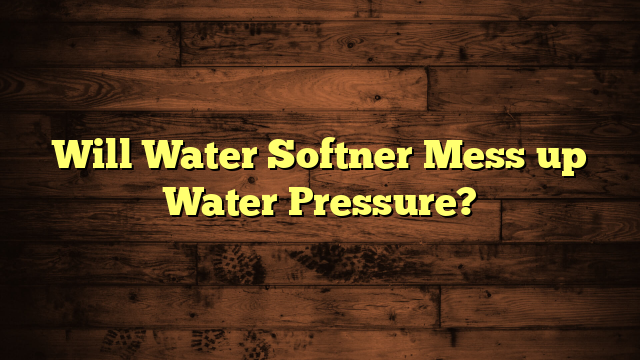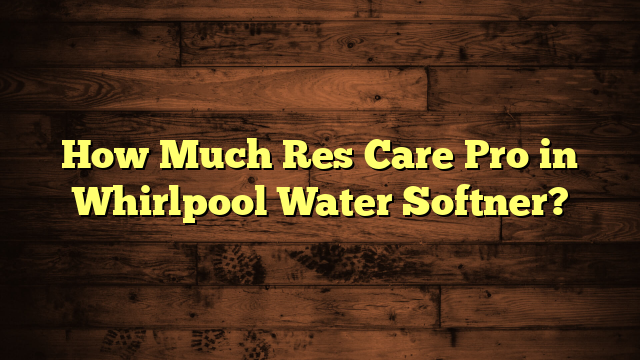Will Water Softner Mess up Water Pressure?
Water softeners can enhance your water quality, yet you might worry about their impact on water pressure. While many users report no significant issues, some experience temporary drops during regeneration cycles. This raises questions about whether your system is properly sized and maintained. Understanding the balance between softening efficiency and flow rates is essential, and it might surprise you to learn what factors actually influence water pressure in your home. Let's explore how you can guarantee your water softener works effectively without compromising your water flow.
Key Takeaways
- Properly sized water softeners maintain or enhance water flow rates without significantly affecting water pressure.
- Temporary pressure fluctuations may occur during the regeneration cycle but are usually manageable.
- Regular maintenance of water softeners ensures optimal performance and helps prevent pressure drops.
- Clogged pipes or outdated plumbing systems are more likely to cause persistent low pressure than the water softener itself.
- Consulting with professionals can help select the right softener and prevent issues with water pressure.
Understanding Water Softeners
Understanding water softeners is essential if you want to tackle hard water issues in your home. Hard water contains high levels of minerals, particularly calcium and magnesium, which can cause mineral buildup in your plumbing and appliances. This buildup can lead to costly repairs and decreased efficiency in your water-using devices.
When you install a water softener, you're changing the water composition in your home. The softener works by using a process called ion exchange, where the hard minerals are replaced with sodium ions. This effectively reduces the hardness of the water, minimizing the risk of mineral buildup.
As a result, you'll notice that your dishes come out cleaner, your laundry feels softer, and your skin feels smoother after showers.
Additionally, a water softener can prolong the lifespan of your plumbing and appliances. By preventing mineral buildup, you're ensuring that your water flow remains unobstructed. This not only enhances the performance of your fixtures but also helps maintain ideal water pressure throughout your home.
How Water Pressure Works
When you turn on a faucet or shower, water pressure determines how forcefully the water flows from the fixture. Water pressure is fundamentally the force that pushes water through your plumbing system, and it can vary based on several factors. A well-maintained system typically has a consistent pressure, allowing for ideal water flow.
Pressure regulation plays an essential role in your home's plumbing. It guarantees that water flows at a steady rate without overwhelming your pipes or fixtures. If the pressure is too high, it can lead to leaks or even damage your plumbing system. Conversely, low pressure might leave you frustrated with a weak shower or trickling faucets.
Many homes have pressure regulators installed, which help maintain consistent pressure levels. These devices adjust the force of water entering your home, balancing the demand from various fixtures.
Factors like the size of your pipes, the distance from the water source, and the overall demand for water in your household can all impact water pressure.
Understanding how water pressure works helps you appreciate the importance of maintaining your plumbing system for dependable water flow.
Effects of Water Softeners
Water softeners frequently change the dynamics of your home's water supply, impacting both water quality and pressure.
When you install a water softener, you might notice an improvement in water quality due to the removal of hard minerals like calcium and magnesium. This leads to softer water that feels better on your skin and helps prevent scale buildup in your pipes and appliances.
However, these systems can affect water pressure in some cases. If the softener isn't sized properly for your home or isn't maintained regularly, you might experience reduced water flow.
To avoid this, follow some maintenance tips: regularly check the salt levels and clean the brine tank to guarantee efficient operation.
It's also essential to monitor the filter and resin beads, replacing them when needed.
Common Misconceptions
You might think that installing a water softener will always cause a significant drop in water pressure, but that's not necessarily true.
Many believe that flow rates are negatively impacted, yet proper installation can actually maintain or even enhance performance.
Let's clear up these common misconceptions and explore how various factors truly affect your system.
Pressure Drop Concerns
Many homeowners worry that installing a water softener will lead to a considerable drop in water pressure. This concern often stems from misconceptions about how softeners work and their potential softener effects on your plumbing system.
In reality, a properly sized and installed water softener shouldn't cause any noticeable pressure drop. When you choose an appropriate model based on your home's water usage, the risk of experiencing diminished water pressure decreases greatly.
Many units are designed with high flow rates to guarantee that water can move through your system efficiently, minimizing any pressure issues.
It's also important to note that some pressure fluctuations can occur during the regeneration process, but these are temporary and shouldn't affect your overall water supply.
If you're experiencing consistent low water pressure after installing a softener, it could be due to other factors, such as clogged pipes or an outdated plumbing system, rather than the softener itself.
Flow Rate Myths
Misunderstandings about flow rates can lead homeowners to believe that all water softeners restrict water flow. Many think that the moment they install a softener, their flow rate will plummet, but that's not the case.
The truth is, quality water softeners are designed to maintain ideal flow rates while effectively softening water.
You might've heard that a softener will hurt your water pressure, but it's important to recognize that pressure regulation in a system is influenced by various factors. If you choose a model suited for your household's specific needs, you won't experience significant drops in flow rate.
Another common myth is that all softeners require extensive maintenance that can lead to flow issues. While maintenance is necessary, regular upkeep helps guarantee your system performs efficiently without affecting water pressure.
Understanding these misconceptions can help you make informed decisions about water softeners. When choosing one, focus on flow rates and efficiency rather than succumbing to myths.
Installation Impact Factors
Often, homeowners underestimate the impact that proper installation has on the performance of water softeners. Misconceptions around installation placement and quality can lead to problems that affect water pressure. Here's a breakdown of some common misconceptions:
| Misconception | Truth |
|---|---|
| Location doesn't matter | Installation placement affects flow rates. |
| DIY installation is fine | Professional installation guarantees quality. |
| All systems are the same | Variations in models require specific setups. |
| Softener doesn't need space | Adequate space is essential for maintenance. |
If you place your water softener too close to a wall or in an awkward position, it can restrict water flow, leading to decreased pressure. Moreover, if the installation quality is poor, you might experience leaks or blockages, further jeopardizing your water pressure. Always prioritize hiring professionals who understand the nuances of your specific system and can guarantee ideal installation. By addressing these factors, you can enjoy the full benefits of your water softener without sacrificing water pressure.
Factors Influencing Water Pressure
When you're evaluating water pressure, two key factors come into play: pipe size and fixture demand.
The diameter of your pipes directly affects how much water can flow through them, while the number of fixtures in use can create fluctuations in pressure.
Understanding these influences can help you pinpoint any issues you might be facing.
Pipe Size Impact
The size of your pipes plays an important role in determining water pressure throughout your home. When you consider pipe diameter effects, larger pipes generally allow more water to flow through, which can lead to higher pressure at fixtures. Conversely, smaller pipes can restrict water flow, causing pressure drops, especially when multiple outlets are in use.
Your plumbing layout also influences how effectively water travels from the source to your faucets and appliances. If your home has a complex layout with numerous bends and turns, smaller pipes might struggle to maintain sufficient pressure. This is particularly true if the overall design requires water to travel long distances.
Additionally, if you're considering installing a water softener, it's vital to guarantee that your existing pipes can accommodate the system. A water softener may require a certain flow rate to function efficiently. If your pipes are too narrow or if the configuration is inefficient, you might experience decreased water pressure after installation.
In short, paying attention to pipe size and plumbing layout can help you avoid unwanted issues with water pressure in your home.
Fixture Demand Variation
Fixture demand variation can greatly impact water pressure in your home. When multiple fixtures, like faucets, showers, and appliances, are used simultaneously, you might notice a drop in water pressure. This is because each fixture demands a portion of the overall water supply.
If several fixtures are running at the same time, the pressure can fluctuate, leading to an unsatisfying experience—especially during showers or while filling a tub.
For instance, if you're washing clothes while someone else is showering, you could feel the difference in pressure. The more fixtures you have running, the more significant the impact on pressure. This can be particularly pronounced in homes with older plumbing systems that may not handle high fixture demand well.
To mitigate these pressure fluctuations, consider staggering your water usage. You can also look into upgrading your plumbing system or installing a pressure-regulating valve.
Maintaining Water Pressure
Maintaining ideal water pressure is essential for the efficient operation of your water softener and overall plumbing system. Pressure maintenance guarantees that your appliances and fixtures work effectively, providing you with a consistent flow of water. When you neglect water pressure, you might face frustrating issues like irregular flow or even damage to your plumbing.
To help you visualize the impact of water pressure, here's a quick look at how pressure consistency affects your daily life:
| Situation | Low Water Pressure | Ideal Water Pressure |
|---|---|---|
| Shower Experience | Weak, dribbling water | Invigorating, strong flow |
| Washing Dishes | Slow, frustrating rinsing | Quick, efficient cleaning |
| Laundry Washing | Incomplete cycles, poor results | Thorough, effective washing |
| Watering Plants | Uneven distribution, dry patches | Even, healthy moisture |
Choosing the Right Water Softener
Finding the right water softener can greatly improve your home's water quality and overall comfort. Start by considering the different softener types available, such as salt-based, salt-free, and dual-tank systems. Each type has its advantages, so think about your specific needs.
For example, if you have a large household, a dual-tank system may be ideal, as it can provide continuous soft water without downtime.
Next, pay attention to capacity ratings. This number indicates how much hardness the softener can handle before it needs regeneration. For smaller households, a unit with a lower capacity might suffice, while larger families will need a model with a higher capacity rating to keep up with demand.
Don't forget to factor in your water hardness level, as this will guide your choice. Some softeners come with additional features, like digital controls or automatic regeneration, which can enhance performance and ease of use.
Seeking Professional Advice
When it comes to selecting the right water softener, many homeowners find it beneficial to seek professional advice. Consulting professionals can help you navigate the variety of options available, guaranteeing you choose a system that suits your specific needs.
Water softeners can vary considerably in size, type, and features, and an expert's insight can clarify which one will work best for your home.
By seeking expert guidance, you can also gain a better understanding of how a water softener might affect your water pressure. Professionals can assess your current water pressure and flow rate, helping you identify any potential issues that could arise from installation.
They'll also explain the necessary adjustments to maintain ideal pressure levels.
Taking the time to consult experts not only saves you from making costly mistakes but also assures you get the best possible performance from your new system.
Ultimately, seeking professional advice can lead to a more efficient home and improved water quality, giving you peace of mind.
Frequently Asked Questions
Can Water Softeners Cause Leaks in Plumbing Systems?
Water softeners can cause leaks in plumbing systems if not properly maintained. You should regularly check for water softener leaks to avoid costly plumbing repairs and guarantee your system operates efficiently without issues.
Do Water Softeners Require Regular Maintenance to Function Properly?
Think of your water softener like a car; it needs regular maintenance to run smoothly. With proper softener maintenance and timely resin regeneration, you'll guarantee it works efficiently and prolong its lifespan. Don't neglect it!
What Are the Signs of Low Water Pressure After Installing a Softener?
After softener installation, you might notice reduced water pressure if faucets dribble, showers lack force, or appliances run slowly. These signs indicate potential issues with your system that need addressing for ideal performance.
How Long Do Water Softeners Typically Last Before Needing Replacement?
Water softeners typically last about 10 to 15 years before needing replacement. Keep an eye out for replacement signs like reduced efficiency or increased salt usage, indicating it's time for a new unit.
Can Water Softeners Affect My Home's Water Heater Efficiency?
Did you know that 30% of energy bills stem from heating water? Water softeners can improve water quality, enhancing heating efficiency by preventing scale buildup in your heater, ensuring it operates smoothly and saves you money.
Conclusion
In the world of water softeners, it's true that "an ounce of prevention is worth a pound of cure." When properly sized and maintained, your water softener shouldn't mess with your water pressure. While you might notice slight fluctuations during regeneration, these are temporary and manageable. By staying on top of maintenance and choosing the right system, you can enjoy soft water without sacrificing the pressure you need. Keep your plumbing flowing smoothly!







